As your business begins to develop and grow, and you begin to recruit more employees, the need for a good small business server may arise in order to keep your business running smoothly.
What may have worked in your garage, when you were the only employee, won’t work efficiently as you begin to scale up.
When you first started your business, factoring in servers were probably not at the top of the list of things to do.
However, as your small business begins to grow, this is something really important to think about. In fact, setting up a small business server network is one of the first steps a business will need to take, big or small.
To find out what a server is, what types of servers exist, what the costs are, and how to set up a server network for a small business, read on. The article covers the following:
What Is A Server?
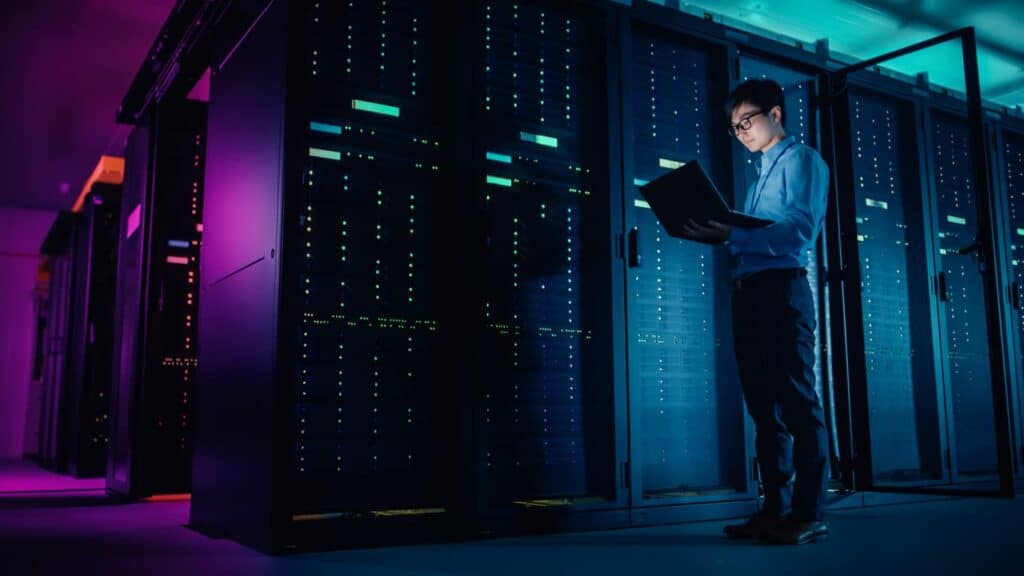
A server, or server network, refers to powerful computers (or just one computer) that are used as a central repository for data and programs.
A server helps to provide a multitude of resources including storage, email services and hardware access.
To be specific, a server network is a system that enables the storing, sharing and management of resources across other computers within the network.
Server networks help simplify and create efficiency for the system administrator. Any network configuration can be applied to a network server instead of individually implementing them on every computer connected to the network.
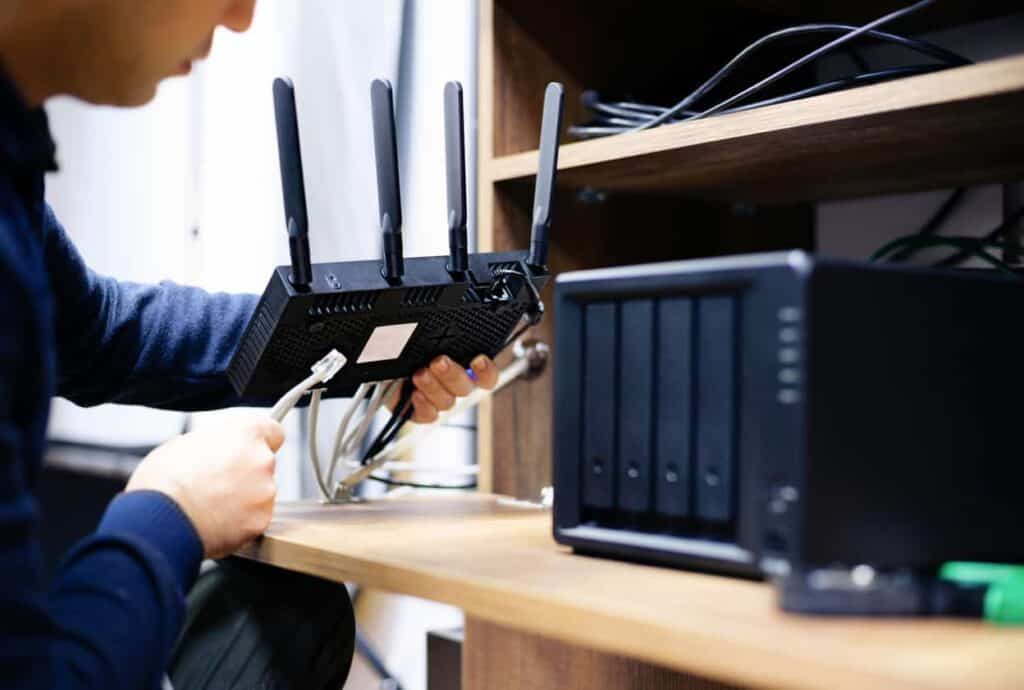
Any computer can be a network server, but the difference between a server and a workstation is not the specific hardware itself, but instead the function of the device.
A workstation is still a computer but is used by an individual to perform their work, whereas a network server is any computer or computers that provides users with access to shared and secure resources.
Furthermore, a network server will usually be built with much more powerful components and computing power than an average workstation, including plenty of external memory (RAM), data storage, processing speed and more.
When working on documents or files on your computer or device, saving your work on your local device is a must-do.
However, if your device was to unexpectantly crash, if you were to lose access to your device, or if you needed to access the files from another device, that could potentially be a big problem.
A network server addresses this problem, allowing you to access data from all your devices (by hosting the files and programs on the network), therefore alleviating the issue.
Types Of Servers
There are many types of servers, all performing different functions, with many networks containing one or more servers.
Whilst most people usually think of servers as just web servers, there are actually several other types including more local-based options. Even as a small business, you are likely to need at least one server.
The most common types of servers are:
File Servers
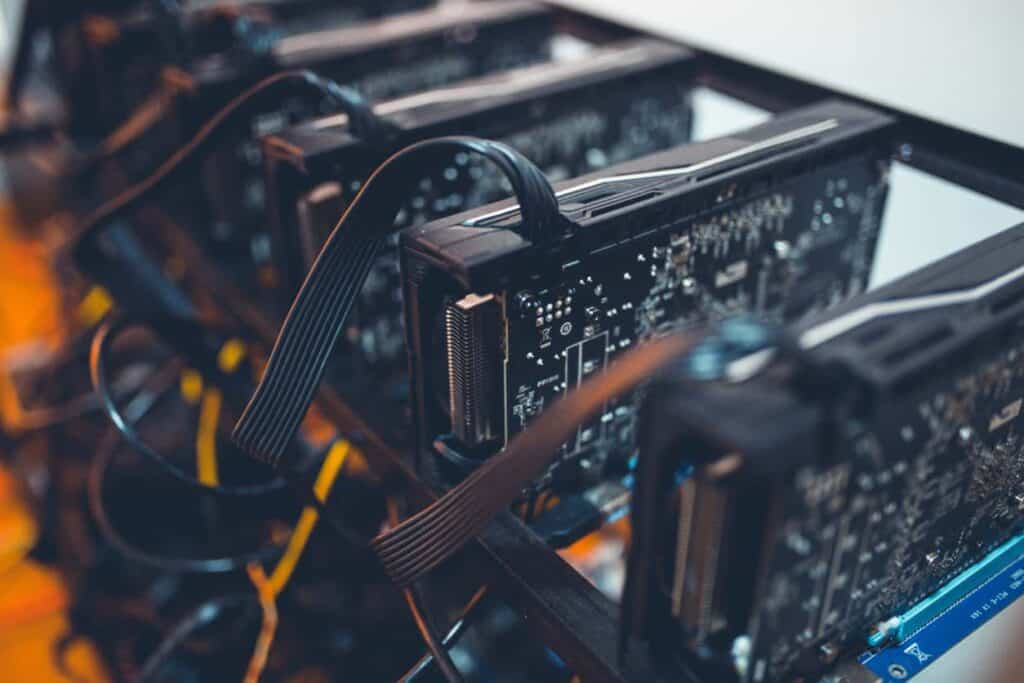
A file server refers to a computer that is attached to a network, providing a location for shared disk access and is used to store and distribute files across that network.
Multiple users on the network can store, share and receive files stored on a file server. A file server can be used as security for your files, as it can act as a backup solution.
Application Servers
Application servers, sometimes referred to as ‘middleware’, occupies a large portion of computing between the end-user and the database servers, simultaneously connecting them together.
Application servers can be used to run resource-intensive applications that are shared across the network by multiple end-users, which removes the need for each individual client to have sufficient resources.
Furthermore, it also alleviates the need to manage software and software installations on many devices and instead is just needed on one.
Database Servers

A database server is a high-powered computer that stores and manages data, as well as provides database services, for a network of users and devices. It functions as a large storage space that organisations can use to run a series of programs to meet their requirements.
Print Servers
A print server is a server that connects remotely to local computers in order to print through a network.
If you work in an office, you may notice that you can print from any device in the office, and it goes to one hub printer. Print servers give a company the ability to serve the entire department using one printer.
Proxy Servers
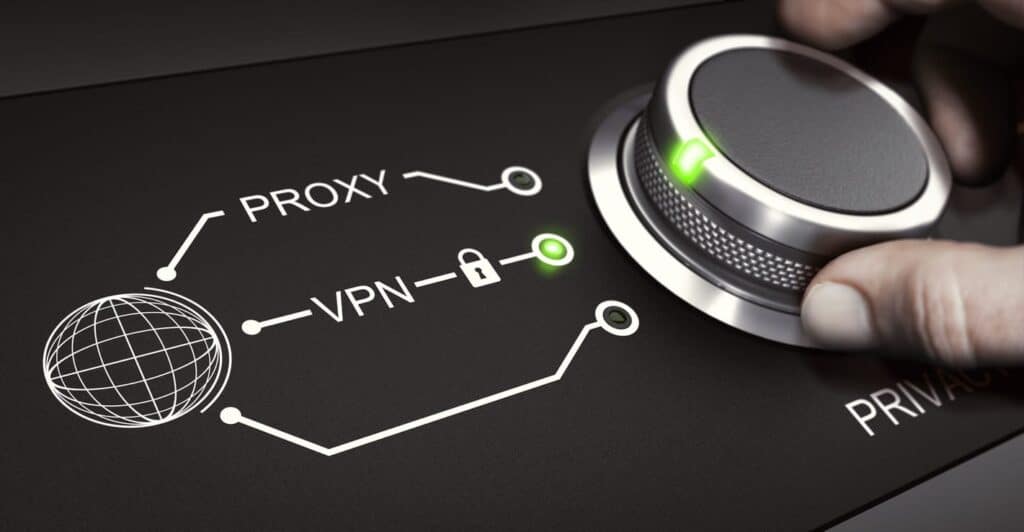
A proxy server serves as a middleman between the client and server, in order to improve performance, share connections and for security reasons.
The proxy server takes a request from the client, which then passes the request on to another server or process.
The proxy server then receives the response from that server and then responds to the original client.
Mail Servers
A mail server stores and delivers mail through an email service platform. Every email that is ever sent, passes through a series of mail servers until it reaches the desired recipient, and allows you to send emails to anyone, anywhere.
From the client-side, it may feel like it happens instantly, however, a series of events have happened to allow for this outcome.
If mail servers didn’t exist, you would only be able to send emails to other people with matching domains.
Web Servers
In essence, a web server powers websites, accepting requests via HTTP (or its secure version HTTPs). A web server refers to a computer that stores webserver software and website component files, such as HTML.
Do I Need A Server?
Once you have more than one computer in your business or need remote access to the company network from other connected devices, it may be time to invest in a server.
By investing in servers, you will give your employees the capability to access software, files and more.
However, many small businesses don’t need a server, thanks to the power of cloud computing.
Cloud servers, meaning that as long as your employees have an internet connection, they can access software, files and information anywhere without needing to be connected to wired networks.
Physical servers, on the other hand, are potentially more secure, meaning they will give your business stronger protection and security.
If you have a small business server, and it is managed correctly, it will have a dedicated backup and recovery system in place too.
Do I Need A Cloud Server?
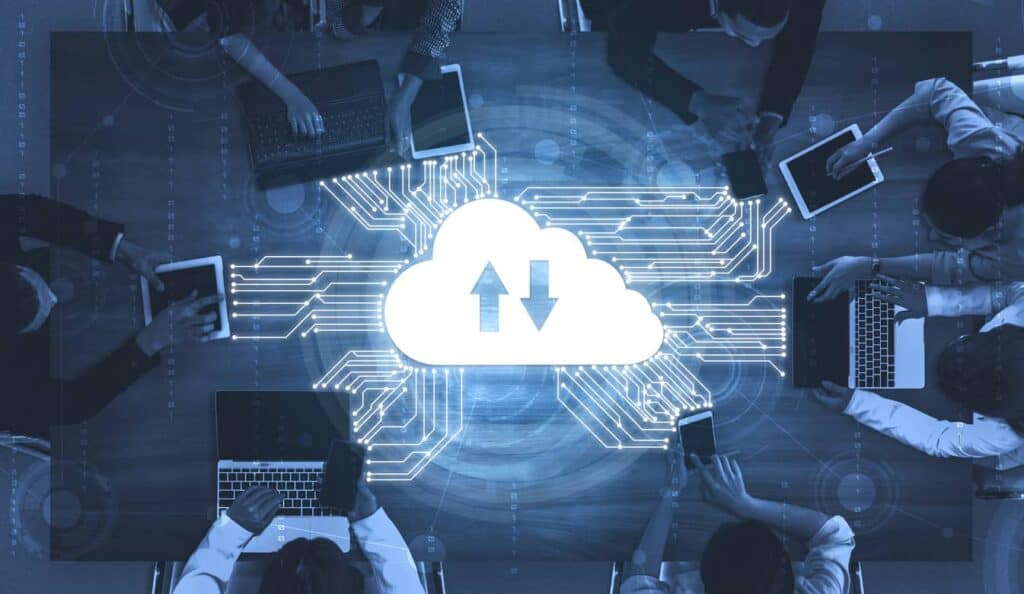
Cloud-based servers refer to a server resource that is hosted and delivered over a network instead of a computer and is able to be accessed on demand by more than one user.
Whether you need a cloud server, has many factors, such as the maturity of your business.
For example, a small business server may require an on-premise server when they are first starting out but then decide to move to a cloud server as they begin to develop.
They may also start with an on-premise server, and migrate to a cloud-based server as it is considered easier to handle and more flexible. All you require is access to the internet.
The four main benefits of cloud hosting are; scalability, reliability, versatility, and security. Discover what cloud server hosting is here.
If you do decide to opt for cloud hosting, get in contact with us, and we can help you set one up.
Here at GRIT Consultancy, we work alongside our trusted reseller partner, vCloud, hosted in state-of-the-art UK data centres, combines the benefits of a dedicated infrastructure with the flexibility, reliability and on-demand resources of the public cloud.
If you don’t opt for a cloud server, read on to find out how much a server may cost.
How Much Does A Server Cost?
It would be difficult to pinpoint the exact price range for a server. There are multiple types of servers, all of which have their own benefits and cons. The types of physical servers are:
- Tower Server – this is a computer intended to be used as a server, and is built in a free-standing cabinet, much like a normal computer.
- Blade Server – This is a modular server that allows multiple servers to be stored in a smaller space. It is a type of server that allows for higher volumes of server capabilities.
- Rack Server – A rack server, also known as a rack-mount server, is a computer designed to be stored in mounting facilities, stacked on one another.
- There are able to hold multiple servers in a storage device.
Depending on which server you opt for, will massively influence the price. Whether they are a worthwhile investment, will depend on your individual needs.
Servers used by large storage clouds such as Google Drive or Amazon Cloud will be extremely costly. For the average non-business, servers are cheap and available. Depending on your needs, or the size of your business could be the difference between spending £500 or £110,000.

Server Costs
Entry-Level
A basic, entry-level server would usually mean a tower server, and would cost anywhere between £500 and £750. These types of servers are very basic, and should always be partnered with a server backup solution. This price also doesn’t include a warranty, which averages at around £150 for the hardware.
Mid-Level
The mid-level tower servers will be slightly upper budget, ranging from £1,500 to £3,500, with a slightly more expensive warranty. This ranges from £150 to £500.
High-End
This is where the price starts to increase exponentially. A high-end tower server with multiple CPUs, large amounts of RAM and virtualisation software, will cost you between £3,500 and £5,000.
High-End Rack Servers
A high-end rack server, with multiple CPUs, large amounts of RAM and virtualisation software, could you cost you anywhere from £4,000 to £10,000.
Hyper-Converged Infrastructure
A hyper-converged infrastructure, or HCI for short, combines multiple rack servers into a cluster, using networking, storage and virtualised computer. These are likely to cost anywhere between £35,000 and £110,000 and are on the upper end of the bracket.
Which Server Solution Is Best For Your Small Business
Choosing the best server solution can be difficult, especially for a small business. There are so many server types to choose from, as well as all the other elements of your IT infrastructure to think about, which include physical components, as well as software and network components.

In a digital-based world where businesses of all sizes are reliant on access to huge amounts of data, the use of servers is becoming more and more prevalent. For a small business, we would recommend cloud servers as it is a lot cheaper and more flexible. Physical servers, like any business-related hardware, can get expensive very quickly.
How Can GRIT Consultancy Help You With Your Server?
Whether you opt for an on-premise, physical server, or a cloud-based server, installing and managing it can be difficult. Not only that but keeping it safe against cybercriminals is a must. Defending against cyber threats can be extremely challenging without a dedicated team with years of technical expertise.
At GRIT Consultancy, we provide secure private cloud hosting. In fact, your security is our top priority, meaning we only work with a cloud provider that’s Cyber Essentials Plus, ISO 9001 and 27001 accredited.
We offer affordable, flexible support packages to suit the needs of any business, both big and small, and can use our years of industry experience to build or consult you when creating your IT infrastructure.
Get in contact today.

